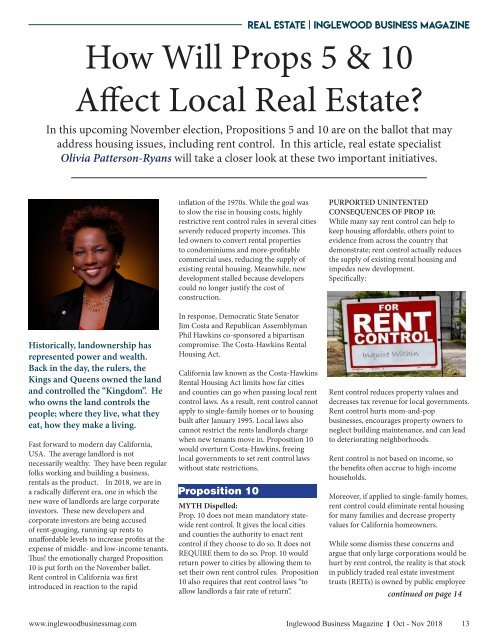Inglewood Business Magazine October 2018
Olivia Patterson-Ryans discuss upcoming Propositions 5 & 10. How politics affect Inglewood small business. Health & Wellness: Eating healthy in 2018 and much more!
Olivia Patterson-Ryans discuss upcoming Propositions 5 & 10. How politics affect Inglewood small business. Health & Wellness: Eating healthy in 2018 and much more!
Create successful ePaper yourself
Turn your PDF publications into a flip-book with our unique Google optimized e-Paper software.
Real Estate | <strong>Inglewood</strong> business magazine<br />
How Will Props 5 & 10<br />
Affect Local Real Estate?<br />
In this upcoming November election, Propositions 5 and 10 are on the ballot that may<br />
address housing issues, including rent control. In this article, real estate specialist<br />
Olivia Patterson-Ryans will take a closer look at these two important initiatives.<br />
Historically, landownership has<br />
represented power and wealth.<br />
Back in the day, the rulers, the<br />
Kings and Queens owned the land<br />
and controlled the “Kingdom”. He<br />
who owns the land controls the<br />
people; where they live, what they<br />
eat, how they make a living.<br />
Fast forward to modern day California,<br />
USA. The average landlord is not<br />
necessarily wealthy. They have been regular<br />
folks working and building a business,<br />
rentals as the product. In <strong>2018</strong>, we are in<br />
a radically different era, one in which the<br />
new wave of landlords are large corporate<br />
investors. These new developers and<br />
corporate investors are being accused<br />
of rent-gouging, running up rents to<br />
unaffordable levels to increase profits at the<br />
expense of middle- and low-income tenants.<br />
Thus! the emotionally charged Proposition<br />
10 is put forth on the November ballet.<br />
Rent control in California was first<br />
introduced in reaction to the rapid<br />
inflation of the 1970s. While the goal was<br />
to slow the rise in housing costs, highly<br />
restrictive rent control rules in several cities<br />
severely reduced property incomes. This<br />
led owners to convert rental properties<br />
to condominiums and more-profitable<br />
commercial uses, reducing the supply of<br />
existing rental housing. Meanwhile, new<br />
development stalled because developers<br />
could no longer justify the cost of<br />
construction.<br />
In response, Democratic State Senator<br />
Jim Costa and Republican Assemblyman<br />
Phil Hawkins co-sponsored a bipartisan<br />
compromise: The Costa-Hawkins Rental<br />
Housing Act.<br />
California law known as the Costa-Hawkins<br />
Rental Housing Act limits how far cities<br />
and counties can go when passing local rent<br />
control laws. As a result, rent control cannot<br />
apply to single-family homes or to housing<br />
built after January 1995. Local laws also<br />
cannot restrict the rents landlords charge<br />
when new tenants move in. Proposition 10<br />
would overturn Costa-Hawkins, freeing<br />
local governments to set rent control laws<br />
without state restrictions.<br />
Proposition 10<br />
MYTH Dispelled:<br />
Prop. 10 does not mean mandatory statewide<br />
rent control. It gives the local cities<br />
and counties the authority to enact rent<br />
control if they choose to do so. It does not<br />
REQUIRE them to do so. Prop. 10 would<br />
return power to cities by allowing them to<br />
set their own rent control rules. Proposition<br />
10 also requires that rent control laws “to<br />
allow landlords a fair rate of return”.<br />
PURPORTED UNINTENTED<br />
CONSEQUENCES OF PROP 10:<br />
While many say rent control can help to<br />
keep housing affordable, others point to<br />
evidence from across the country that<br />
demonstrate; rent control actually reduces<br />
the supply of existing rental housing and<br />
impedes new development.<br />
Specifically:<br />
Rent control reduces property values and<br />
decreases tax revenue for local governments.<br />
Rent control hurts mom-and-pop<br />
businesses, encourages property owners to<br />
neglect building maintenance, and can lead<br />
to deteriorating neighborhoods.<br />
Rent control is not based on income, so<br />
the benefits often accrue to high-income<br />
households.<br />
Moreover, if applied to single-family homes,<br />
rent control could eliminate rental housing<br />
for many families and decrease property<br />
values for California homeowners.<br />
While some dismiss these concerns and<br />
argue that only large corporations would be<br />
hurt by rent control, the reality is that stock<br />
in publicly traded real estate investment<br />
trusts (REITs) is owned by public employee<br />
continued on page 14<br />
www.inglewoodbusinessmag.com<br />
<strong>Inglewood</strong> <strong>Business</strong> <strong>Magazine</strong> Oct - Nov <strong>2018</strong><br />
13
















